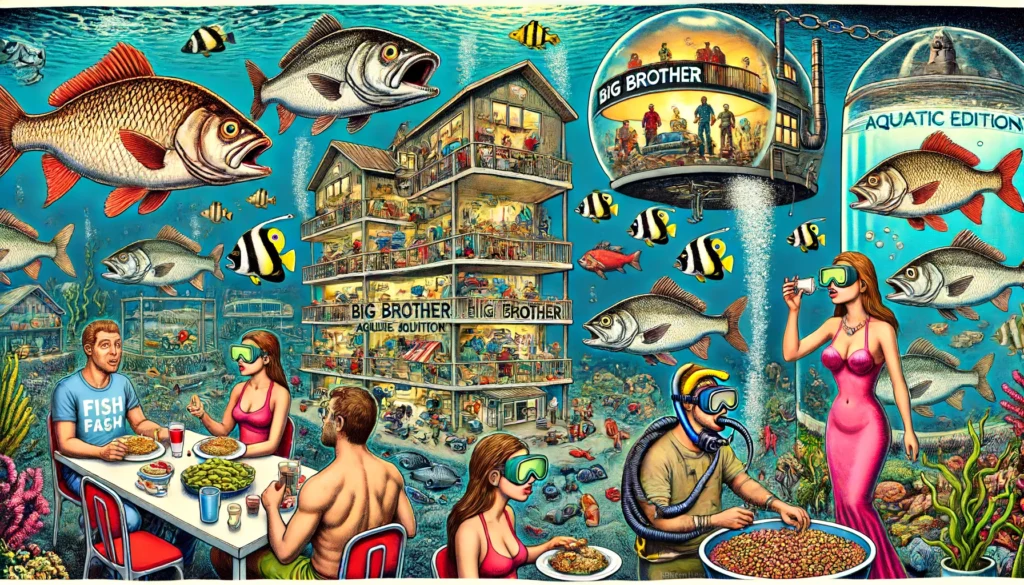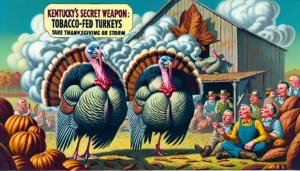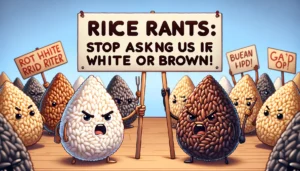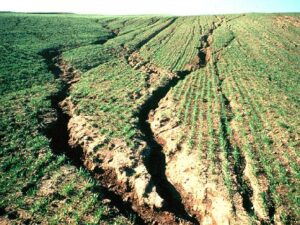
Fish Farming A vivid and detailed illustration in the style of Mad Magazine depicting fish farming as a giant underwater apartment complex. The fish live 2.webp.webp
The Underwater Reality Show: Fish Farming Frenzy Takes Over
In a move that has left oceanographers, environmentalists, and late-night comedians alike flabbergasted, the latest United Nations’ Food and Agriculture Organization report has revealed that farmed fish now outnumber their wild counterparts. Yes, folks, we’re turning the ocean into a sprawling fish condo complex, and the fish aren’t paying rent—yet.
Welcome to Fishville: The Aquatic Apartment Complex
Imagine a bustling cityscape beneath the waves where fish commute to their feeding stations, hang out in schools (literally), and enjoy better living conditions than most urban humans. Fish farmers are now the landlords, ensuring their aquatic tenants are plump and ready for the market. If only human tenants were treated with such care and precision!

Reality TV: Fish Edition
Fish farms are basically underwater reality TV shows. Picture this: “Big Brother: Aquatic Edition.” Fish compete for the top spot, and instead of eviction, they get the honor of becoming your next sushi dinner. Drama, romance, and unexpected hybrids—this show has it all, with contestants swimming their way to your plate.

Farmers’ Markets in Scuba Gear
Visiting a fish farm is like hitting a farmers’ market in scuba gear. “I’ll take two pounds of trout, a side of seaweed, and could you throw in some fresh oysters?” Meanwhile, the fish are looking at you through the glass like, “Hey, we didn’t sign up for this!”

Genetic Love Stories
Farmed fish escaping into the wild and breeding with wild fish is akin to “The Bachelor” but with fins. It’s a romance novel waiting to happen—”When Wild Met Farmed: A Love Tail.” Genetic pollution? More like genetic party, right?

Diesel-Guzzling Fish
Most fish farms run on diesel, which is like fueling a fast-food joint with an oil rig. These fish are essentially swimming in their own drive-thru, waiting for their turn to become the catch of the day. If only they knew what “eco-friendly” meant!
Renewable Fish Power
Swapping out diesel for renewable energy on fish farms could prevent millions of metric tons of carbon emissions. It’s like imagining fish on tiny treadmills, generating power for their own farms. The eco-fish of the future, ladies and gentlemen!
Wild Fish Shenanigans
Wild-caught fish that were raised in hatcheries are like kids returning from summer camp bragging about their “survival skills.” These fish are marketed as “wild,” but they’ve had more human intervention than a Hollywood star’s Botox routine.
Overfishing: The Black Friday of the Ocean
Overfishing is the Black Friday of the marine world. Fishermen snatch up fish faster than you can say “sale,” leaving the ocean shelves emptier than a post-holiday clearance rack. And bycatch? It’s like using a magnet in a hardware store—everything gets caught, but nothing useful.
Frequent Flyer Fish
Most farmed salmon sold in the U.S. are flown in from overseas. These fish have more frequent flyer miles than your average business executive. Who knew your dinner had traveled more than you did last year?
Small Fish, Big Impact
Eating smaller fish like mussels and clams is the seafood equivalent of opting for a salad over a triple-decker burger. It’s better for your waistline and the planet, though it might not satisfy your craving for something more substantial—like a good steak.
Fish Farmers’ Renewable Energy Revolution
Imagine fish farmers using renewable energy—fish swimming laps to power their own farms. It’s a scene straight out of a sci-fi novel: “The Fish Who Powered the World.” Coming soon to a theater near you.
Seafood GPS: Fish With Fitbits
With GPS mapping and remote sensors, fish farming has gone high-tech. Next thing you know, fish will be wearing Fitbits, tracking their steps (or rather, swims) and heart rates. “I hit my goal of 10,000 fins today!”
Aquatic Veggies: The Next Big Thing
Seaweed farming could be the new avocado toast. Kelp smoothies, seaweed salads, and algae snacks are poised to become the latest health craze. Just wait until Instagram influencers get hold of this trend!
Lobster Diet Plan
Lobsters getting fattened up with bait is like tossing croutons into a salad and calling it diet food. At least these crustaceans are eating better than most of us. “Feed me more bait, I need to bulk up for the tourists!”
Conclusion: A Fishy Future
As the world continues to farm more seafood than it catches, the lines between farmed and wild fish blur. Whether it’s the reality show antics of fish farms or the eco-friendly dreams of renewable-powered fish tanks, one thing is clear: the seafood industry is swimming in uncharted waters. So next time you’re at the seafood counter, remember the adventures your dinner has had—and maybe give those mussels a second glance.
Originally Published at FarmerCowboy.com
2024-06-15 14:03:26
Originally posted 2024-06-18 00:58:58.
Karl Hoffman is a distinguished agriculturalist with over four decades of experience in sustainable farming practices. He holds a Ph.D. in Agronomy from Cornell University and has made significant contributions as a professor at Iowa State University. Hoffman’s groundbreaking research on integrated pest management and soil health has revolutionized modern agriculture. As a respected farm journalist, his column “Field Notes with Karl Hoffman” and his blog “The Modern Farmer” provide insightful, practical advice to a global audience. Hoffman’s work with the USDA and the United Nations FAO has enhanced food security worldwide. His awards include the USDA’s Distinguished Service Award and the World Food Prize, reflecting his profound impact on agriculture and sustainability.





Growth is achieved when we challenge ourselves to learn something new every day. ??